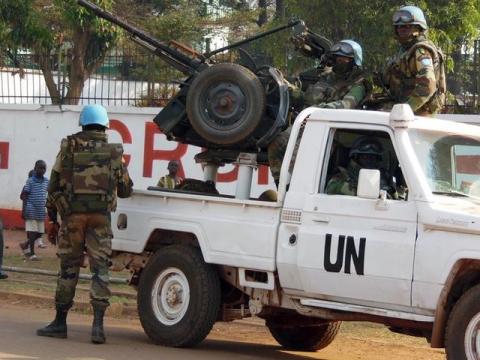Advertisement
U.N. memo casts doubt on some Central African sex abuse accusations
DAKAR/UNITED NATIONS/PARIS (Reuters) - A draft United Nations memo seen by Reuters suggests that dozens allegations of sexual abuse against U.N. peacekeepers in Central African Republic have been fabricated by people seeking financial payoffs.
The revelations put the spotlight back on how the world body deals with abuse cases. In December an independent review panel criticised the United Nations for mishandling allegations of child sexual abuse by international peacekeepers, who were not under U.N. command, in Central African Republic.
The 12,000-strong U.N. peacekeeping force there, known as MINUSCA, has been dogged by allegations of sexual abuse since its deployment in April 2014 to curb fighting between the mostly Muslim Seleka rebels and the anti-balaka Christian militias.
French troops deployed in a separate intervention in the former French colony have also been accused of abuses.
The United Nations in March expanded its inquiry into new accusations of sexual abuse and exploitation in the country's Dekoa region. It told France, Gabon and Burundi that dozens of accusations had been made against their soldiers in MINUSCA.
However, an internal Aug. 24 memo - written by the chief of the U.N. Department of Field Support's Conduct and Discipline Unit suggested many accusations were strikingly similar and appeared to be motivated by financial gain.
Written by Mercedes Gervilla, the memo, citing information from the U.N. Office of Internal Oversight Services, said: "OIOS notes that many of the complaints followed a specific pattern of accusations; many of the complainants' stories were nearly identical, lacked specific details and fell apart when probed. It appeared as though the complainants had memorized a script."
The memo said a local charity tasked with referring abuse accusations to the U.N. children's agency UNICEF had placed complainants on a monthly remuneration scheme, offering a financial incentive for people to present themselves as victims.
The memo appeared to be a draft as it had not been signed by Gervilla.
PAYMENTS "ROUTINE PART" OF RESPONSE TO ABUSES
"Further, OIOS obtained information indicating that a purported social worker was inciting complainants to make false allegations given the possible economical return. The same person is said to have extorted payments from complainants in exchange for being presented as victims," Gervilla wrote.
UNICEF spokeswoman Marixie Mercado said it had a long-standing arrangement with a local charity to provide care to children and women who come forward as victims of sexual abuse. She said cash transfers to those people were a "routine part" of the response to sexual abuse and exploitation.
"UNICEF has no role in determining whether a person coming forward as a victim has in fact been sexually abused or sexually exploited," she said. "As a first-line responder to these incidents UNICEF proceeds on the assumption that a person coming forward as a victim is entitled to care and support."
Mercado said that as part of the response to the accusations of abuses in Dekoa, the charity had provided a one-time payment of $35 to 106 self-described victims.
The memo, which said the OIOS investigation was close to completion, focused on more than 150 accusations made between March and June this year about events that happened between 2013 and 2016 and involved troops from Burundi and Gabon.
Gervilla estimated that about 50 percent of cases were not supported by any evidence and only 20 percent by substantive evidence. The remaining 30 percent had partial evidence, but lacked corroborating material.
"It should also be noted that the substantive allegations are of sexual exploitation - sex in exchange for food. There is little or no substantial evidence of sexual abuse," she wrote.
Gervilla said a further 216 allegations were made against Burundian, Gabonese and French forces during an OIOS fact-finding mission at the end of August.
"Many if not all of these allegations result from what appears to a systematic effort to initiate false accusations against peacekeeping personnel in Dekoa," she said.
A U.N. peacekeeping official in New York said the OIOS had interviewed some 435 complainants and witnesses. The evidence was now being reviewed by OIOS ahead of final reports to be sent to U.N. troop-contributing countries for appropriate action to ensure accountability of peacekeepers.
MINUSCA spokesman Herve Verhoosel said the mission was taking the allegations seriously but would not comment further until the investigation was finished.
France, which at its peak had some 2,000 soldiers in Central African Republic, has initiated investigations in Paris but has yet to charge anybody.
(Writing by John Irish; editing by Mark Heinrich)



















Add new comment